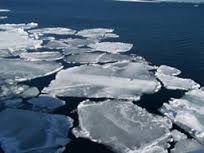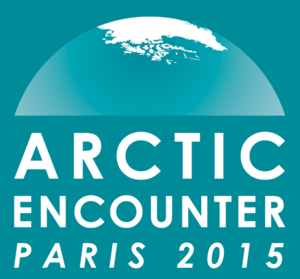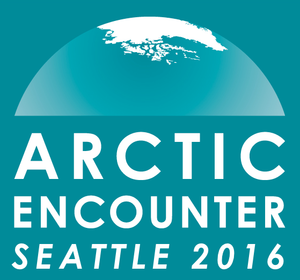|
|
|
|
|
|
|
|
Today's Congressional Action:
The House of Representatives and Senate are in session and expected to consider non-Arctic legislation.
|
 Test of Readiness: Cruise Ship to Transit Northwest Passage Opened by Sea-Ice Retreat. It's been a little over a century since Norwegian explorer Roald Amundsen first navigated the ice-blockaded waters of the Northwest Passage, the long-sought shortcut from Europe to Asia. And now that climate change has melted enough sea ice to open up the route over the past couple of summers, a Hong Kong-based company plans to send a luxury cruise ship through next August. KUAC Test of Readiness: Cruise Ship to Transit Northwest Passage Opened by Sea-Ice Retreat. It's been a little over a century since Norwegian explorer Roald Amundsen first navigated the ice-blockaded waters of the Northwest Passage, the long-sought shortcut from Europe to Asia. And now that climate change has melted enough sea ice to open up the route over the past couple of summers, a Hong Kong-based company plans to send a luxury cruise ship through next August. KUAC
We're on Guard Against Polar Bear Up-List Attempt: Nunavut Minister. Johnny Mike, the Nunavut environment minister, said Oct. 26 in Nunavut's legislative assembly that a fourth attempt to restrict the sale of polar bear parts could occur in 2016, but if it does, the Government of Nunavut will be ready. In a minister's statement, Mike said he would use a recent decision by the Convention on International Trade of Endangered Species, or CITES, which protects the right of hunters to sell legally-hunted polar bear parts, as ammunition against any attempt to revisit the issue. Nunatsiaq Online
 Department of Defense Will Create Strategic Arctic Plan. The Department of Defense is moving forward with plan that could reverse the cuts of U.S. Army troops in Alaska. On Tuesday, Defense Secretary Ashton Carter told Alaska Sen. Dan Sullivan, he's committed to creating an operation plan, or OPLAN, for the Arctic. An OPLAN is a document that lays out military strategy for a region, including how many troops should be stationed there. If the plan calls for troop levels in Alaska to remain the same, or even be increased, it could restore the cuts to Alaska's Army. Right now, the Army is moving ahead with plans to cut 2,700 Alaska soldiers by the end of 2017. KTVA Department of Defense Will Create Strategic Arctic Plan. The Department of Defense is moving forward with plan that could reverse the cuts of U.S. Army troops in Alaska. On Tuesday, Defense Secretary Ashton Carter told Alaska Sen. Dan Sullivan, he's committed to creating an operation plan, or OPLAN, for the Arctic. An OPLAN is a document that lays out military strategy for a region, including how many troops should be stationed there. If the plan calls for troop levels in Alaska to remain the same, or even be increased, it could restore the cuts to Alaska's Army. Right now, the Army is moving ahead with plans to cut 2,700 Alaska soldiers by the end of 2017. KTVA
Coast Guard Eyes Unmanned Systems as a 'Force Multiplier.' Because the Coast Guard is such a small service with so many mission areas, it is seeking to implement unmanned systems as a "force multiplier, to be where personnel cannot be," a Coast Guard officer working on unmanned systems in coordination with the Navy, said Oct. 27. Coordinating with the Navy also follows the Coast Guard's directions to use off-the-shelf systems in order to speed new capabilities to the fleet, said CDR Jeff Vajda, who is a liaison from the Coast Guard Office of Aviation Forces to the Navy's unmanned aerial systems (UAS) program office. Seapower Magazine
 Hunger Gnaws at Canada's North as New Government Promises Relief. Shipping food to this remote village is never easy, but when the river linking it to the rest of Canada's sprawling Northwest Territories starts freezing in November, groceries must be airlifted in by helicopter. Logistical challenges like this push food prices in Canada's far north, particularly for fresh fruits and vegetables, to levels unaffordable for many local residents. Hunger rates across the north are far higher than the Canadian average, with the region's indigenous peoples particularly hard hit. Thomson Reuters Foundation Hunger Gnaws at Canada's North as New Government Promises Relief. Shipping food to this remote village is never easy, but when the river linking it to the rest of Canada's sprawling Northwest Territories starts freezing in November, groceries must be airlifted in by helicopter. Logistical challenges like this push food prices in Canada's far north, particularly for fresh fruits and vegetables, to levels unaffordable for many local residents. Hunger rates across the north are far higher than the Canadian average, with the region's indigenous peoples particularly hard hit. Thomson Reuters Foundation
|
Legislative Action
No Arctic legislation was formally considered yesterday.
|
|
Future Events
The Polar Oceans and Global Climate Change, November 3-6, 2015 (La Jolla, California USA). The American Polar Society will host this Symposium at Scripps Institution of Oceanography. A flyer with a partial list of presenters is available on the Society's website (americanpolar.org) and from the Society's Membership Chairman by email.
Forum for Arctic Modeling and Observational Synthesis Meeting, November 3-6, 2015 (Cape Cod, MA, USA). On November 3rd, the 2015 School for young scientists will consider "Regional Oceanography of the Arctic marginal seas" with lectures covering major features of atmospheric, sea ice and oceanographic regimes of the: Bering, Chukchi, Beaufort, East-Siberian, Laptev Sea, Kara, Barents and Nordic seas. On November 4-6, the meeting portion will summarize project accomplishments for the last 3 years of activities and will focus on the formulation of scientific questions and directions for FAMOS future research (2016-2019) to: (a) improve Arctic modeling, employing very high resolution models; (b) develop and test new arctic monitoring/observing systems and (c) improve predictions of Arctic environmental parameters with reduced uncertainties.
Due North: Next Generation Arctic Research & Leadership, November 5-8, 2015 (Calgary, Alberta, Canada). The Association of Canadian Universities for Northern Studies (ACUNS) will convene an interdisciplinary conference of early career scientists working on Arctic issues. Topics will include: Arctic Communities, Arctic Sustainable Development, Arctic Wildlife, Ecosystem and Biodiversity, Arctic Food Security, Arctic Landscapes, Climate Change and Adaptation, Disaster Risk Management, Policy, Politics and Leadership, Arctic Environment (Data and Techniques), Arctic Resources, and Future of Arctic.
Matchpoints Seminar, November 12-13, 2015 (Aarhus, Denmark). The purpose of the conference is to provide a forum for policy-makers and academics to deliberate on how the security, resilience and sustainability of the globalized Arctic region and its peoples may be enhanced, and what instruments of governance may most suitably contribute. The conference will spell out (1) how the different relevant dimensions of security (military, economic, environmental, energy and human security) manifest themselves in the governing / governance arrangements in the Arctic; (2) how the challenges associated with each manifest themselves, individually and together; and (3) what forms of governing arrangements can best help to address the challenges. The conference will also focus on (4) how the Nordic countries and nations, including Greenland, the Faroe Islands and Aaland Islands, may contribute to the peace, stability and prosperity of the Arctic region through collaborative efforts based on their shared social, human, environmental and democratic values.
** New this week** Arctic Circle Forum (ACF) Singapore, November 12, 2015 (Singapore). The event will be hosted by The Arctic Circle and Singapore Maritime Institute (SMI), with the support of the Singapore Government. The ACF Singapore will be opened by President of Iceland Ólafur Ragner Grímsson and Deputy Prime Minister and Coordinating Minister for National Security of Singapore Teo Chee Hean. Discussions will focus on a range of topics related to Arctic shipping, infrastructure financing, ocean science and research, as well as global collaboration on Arctic affairs. Among the speakers and participants will be Senior Arctic Officials, representatives of major shipping companies, investment funds, and scientific institutes from the United States, Europe, and a number of Asian states.
Arctic Observing Open Science Meeting, November 17-19, 2015 (Seattle, Washington). The Arctic Observing Open Science Meeting will be 2.5 days and held at the Hyatt at Olive 8 in Seattle, Washington. The conference will bring together individuals and teams involved in the collection, processing, analysis, and use of observations in the Arctic - from academia, agencies, industry, and other organizations. The meeting will be convened as a combination of plenary talks, parallel science sessions, and a poster session. The deadline for the Meeting Registration is Tuesday, 20 October. The agenda and registered attendees can be found on the meeting website.
In the Spirit of the Rovaniemi Process 2015, November 24-26, 2015 (Rovaniemi, Lapland, Finland).When the Arctic Environmental Protection Strategy, the so-called Rovaniemi Process, was adopted in 1991, it aimed at overcoming divisions and turning the zone of Cold War military tensions into a region of peace and co-operation. In this joint effort focusing on the protection of environment, and later, sustainable development, the Arctic states supported by indigenous organizations laid grounds for institutionalized collaboration and the emergence of Arctic regional identity. The second international conference will bring together decision-makers, scholars, artists, designers and students to address these questions and discuss the Arctic in global, regional and local perspectives.
** New this week** Arctic Council and Beyond, December 4, 2015 (Ottawa, Ontario, Canada). This one-day conference hosted by The Northern Institute will focus on the role of the Arctic Council as a forum for Arctic cooperation, the place of the Arctic in Canada's foreign policy and approach to the circumpolar world, the role of the Arctic in global relations in light of the increasing interest in the region by European and Asian states, and the voice of Indigenous Peoples within the Arctic Council and in shaping circumpolar countries' Arctic policies.
Arctic Encounter Paris (AEP 2015), December 11-12, 2015 (Paris, France) (During the UN Convention on Climate Change - COP21). The Arctic Encounter Paris will take place at the French Senate at Luxembourg Palace and the  French Military College, École Militaire, in Paris, France, on the final days of the monumental United Nations Convention on Climate Change (COP21) where thousands of global citizens and government delegates will be gathered to deliberate the world's response to our changing planet in Paris. The AEP is the only Arctic policy side event currently planned to take place during the UN Convention. A reception will take place following the closing panel. French Military College, École Militaire, in Paris, France, on the final days of the monumental United Nations Convention on Climate Change (COP21) where thousands of global citizens and government delegates will be gathered to deliberate the world's response to our changing planet in Paris. The AEP is the only Arctic policy side event currently planned to take place during the UN Convention. A reception will take place following the closing panel.
 Fall meeting of the American Geophysical Union, December 14-18, 2015 (San Francisco, California). The 48th meeting of the union brings together nearly 24,000attendees, and lots of Arctic research results. The scientific program is here. There will be several Arctic-related "Town Hall" meetings, including those sponsored by NASA, DOE, NSF, ISAC, IARPC, and SEARCH. Fall meeting of the American Geophysical Union, December 14-18, 2015 (San Francisco, California). The 48th meeting of the union brings together nearly 24,000attendees, and lots of Arctic research results. The scientific program is here. There will be several Arctic-related "Town Hall" meetings, including those sponsored by NASA, DOE, NSF, ISAC, IARPC, and SEARCH.
This symposium is part of an ongoing initiative of the National Academies of Science Polar Research Board to expand public understanding of why the dramatic changes affecting the Arctic region ultimately matter to us all. The agenda features engaging presentations and discussions with top Arctic science and policy experts, and displays and interactive exhibits that illustrate Arctic change and its global impacts. The event is free and open to the public. There are sponsorship opportunities, and a call for exhibitor applications (by Oct.31, 2015). Audience space is limited, so register today; and please encourage your friends, neighbors, and colleagues to participate-as our goal is to reach well beyond the small circle of specialists who typically attend Arctic-themed events in the DC area. The U.S. Arctic Research Commission is helping to sponsor this event.
 Building upon the preceding Arctic Encounter event in Paris, the third annual Arctic Encounter Symposium (AES) in Seattle, Washington will convene policymakers, industry leaders, and leading experts to confront the leading issues in Arctic policy, innovation, and development. As the largest annual Arctic policy event in the United States, the AES mission is to raise awareness, engage challenges, and develop solutions for the future of a region and a people. The two-day program includes two keynote luncheons, expert plenary sessions, break out sessions, a networking cocktail reception and seated dinner. A closing reception will take place at the conclusion of the program. Building upon the preceding Arctic Encounter event in Paris, the third annual Arctic Encounter Symposium (AES) in Seattle, Washington will convene policymakers, industry leaders, and leading experts to confront the leading issues in Arctic policy, innovation, and development. As the largest annual Arctic policy event in the United States, the AES mission is to raise awareness, engage challenges, and develop solutions for the future of a region and a people. The two-day program includes two keynote luncheons, expert plenary sessions, break out sessions, a networking cocktail reception and seated dinner. A closing reception will take place at the conclusion of the program.
|
|

  
4350 N. Fairfax Drive, Suite 510
Arlington, VA 22203, USA
External links in this publication, and on the USARC's World Wide Web site ( www.arctic.gov) do not constitute endorsement by the US Arctic Research Commission of external Web sites or the information, products or services contained therein. For other than authorized activities, the USARC does not exercise any editorial control over the information you may find at these locations. These links are provided consistent with the stated purpose of this newsletter and the USARC Web site.
|
|
|
|
|
|
|
|
|